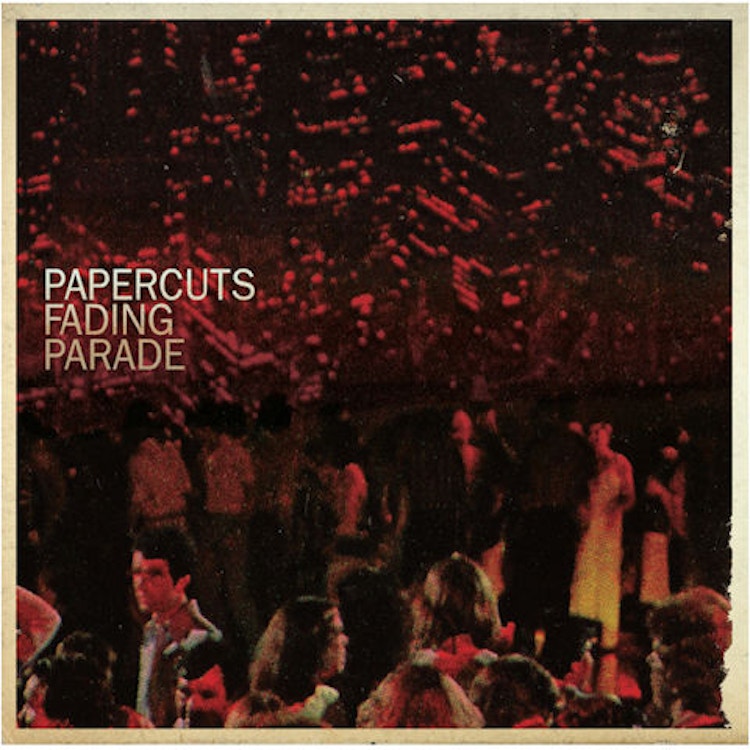"Fading Parade"

Jason Robert Quever, the one-man band that is Papercuts, sounds like a man who’s had his heart broken one time too many. The songs on their fourth long-player, and first for Sub Pop, Fading Parade, are about endings – but Quever seems okay with that. That’s the thing about alt-pop records like this: their dreamy somnolent quality makes them equally perfect listening for the broken-hearted, and the contented.
While the Papercuts dream pop palette still has the same colours as previous releases, hooking up with producer Thom Monahan (Beachwood Sparks, Vetiver) has deepened the tones, meaning that the 12-string, autoharp, piano and organ sounds are no longer quite as murky as they used to be. The reverb’s still there (and makes it hard to hear some of the lyrics), but these songs shimmer with a confidence that maybe wasn’t quite heard on previous Papercuts releases.
Let’s get this out of the way – Fading Parade is an excellent album, probably the best pop record released so far this year. Quever’s considered songwriting is evident throughout, but there’s a run of three tracks in the middle of the record that stand out by a country mile. From ‘Chills’, through ‘The Messenger’ to ‘White Are The Waves’, Papercuts hit a rich vein of stately, grand pop music calling to mind ‘60s staples like The Zombies and The Beach Boys through to the more recent Galaxie 500, but also fellow travellers like tour buddies Beach House, and The Clientele.
Before we get to those tracks, though, there’s the dynamic – nay, anthemic – opening of ‘Do You Really Wanna Know’, all reverb drenched guitars and Wall of Sound production, which is quickly followed with the bass groove of ‘Do What You Will’, a song about a callous lover of whom Quever can’t get enough. “You come as you please / and go as you need…but I can’t shake you off / when you knock at my door.” These feelings lead into the self-explanatory ‘I’ll See You Later, I Guess’, a woozy organ-led dirge which calls to mind the aforementioned Beach House.
‘Chills’, surely a reference to New Zealand’s finest band, builds on Hammond organ, harpsichord and a buried-in-the-mix cello, and Quever singing “She put her hand / over my hand / now I have gone astray”, leading to the most glorious bridge I’ve heard in a long time – this in spite of the accompanying lyric “now I’m feeling sad”. It’s the sort of song you have to hear again instantly, and I defy you not to hit repeat.
If you don’t hit repeat, you get the equally gorgeous ‘The Messenger’, a song about losing direction, which builds from mournful autoharp beginnings to a hopeful ending of organ swirl. ‘White Are The Waves’ is a chilly orchestral wonder which might leave you thinking that Quever is some kind of songwriting mastermind, soon to leave the indie world behind to write soppy ballads for Beyonce.
He sticks around long enough to guide Papercuts through to the end of Fading Parade, giving us the breezy ‘Wait Til I’m Dead’, then ‘Marie Says You’ve Changed’, which finds the singer back in his home town, wondering if her belongs – only for Marie to rather cruelly provide the short and sweet answer. ‘Winter Haze’ is all bouncy folk-pop, and ‘Charades’ waltzes to a lovely close.
I get the feeling that Fading Parade will be high on my end-of-year list, its hazy insouciance belying the fact that it’s a lovingly crafted album produced by a songwriter, Jason Quever, who has more talent than he probably knows. An excellent, excellent listen.
Get the Best Fit take on the week in music direct to your inbox every Friday

Tunde Adebimpe
Thee Black Boltz

Julien Baker & TORRES
Send A Prayer My Way

Bon Iver
SABLE, fABLE






